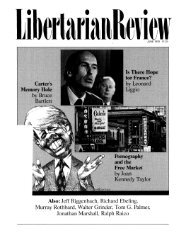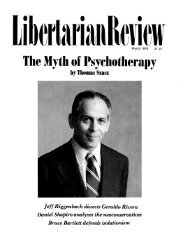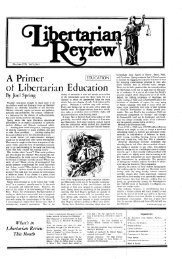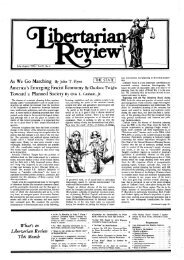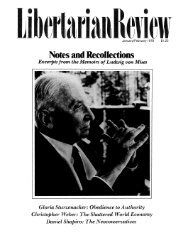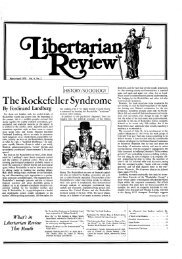The Libertarian Review July 1978 - Libertarianism.org
The Libertarian Review July 1978 - Libertarianism.org
The Libertarian Review July 1978 - Libertarianism.org
Create successful ePaper yourself
Turn your PDF publications into a flip-book with our unique Google optimized e-Paper software.
he desires smaller subsidies than Ms.Minihan may be to his credit, but it israther like the girl who made excuses forhaving an illegitimate baby by sayingthat it was, after all, a very small one."Most people," writes the author,"would agree that the $390 million thatgovernment now provides as direct publicsubsidy of the arts is a very smallevena scandalously small-amount." Ido not dispute that the arts deservemore, but the first question is not howmuch money they deserve but where themoney is to come from.So little, the author complains, isspent· by Americans on the arts, comparedwith "the $40 billion spent onalcoholic beverages and tobacco, the$18 billion spent on toys and sport suppliesand equipment, the $4 billionspent in barber-shops and beauty parlors...." And so on. But these expendituresare voluntarily chosen. Pre-Netzer deploresrising costs, but doesnot even m.ention theunion rules whichsay a m.em.ber of oneunion m.ay dislllantlethe stage scenery,but m.ay not turn offa single light bulb.sumably the author wishes to redirectthe choices of Americans so that theywill spend more on the arts instead; andsince they don't do it now, they must bemade to (via government subsidy). <strong>The</strong>yalso would probably spend much moreon the arts if they weren't already taxedto death- a rather obvious point whichthe author never mentions.When I was on a television programsome time ago with the director of asubsidized music-and-drama <strong>org</strong>anization,he was shocked at my "indifferenceto the arts" when I said there should beno state subsidy; in all his years of endeavorhe had never heard anything so"radical," so "cynical." When I mentionedhow much was going into welfarebenefits he said, "Get rid of the welfarebenefits- put it into the arts!" That'sjust the trouble-each one wants to dodifferent things with other people'smoney. By contrast, when I visitedBrigham Young University for a seriesof talks, my host stopped the car on ahilltop overlooking more than $20 millionworth of new campus buildings,and said with some pride, "Not one bitof it was built with stolen money." Idoubt that the author of this bookwould have appreciated the distinction.Still, there is a lesson in the book forlibertarians: Most of the money that sustainsthe arts in America, the authorpoints out, comes not from direct governmentoutlays such as the NationalEndowment for the Humanities (whichaims to quadruple its federal grants by1980), but from private donationswhich are tax-deductible. In this way,"the government does not even determinethe total amount of the support itprovides.... Instead, the aggregate isdetermined by thousands of decisions onthe part of individual donors."This of course sounds much better;indeed, it is much better. But there is acatch here that libertarians should beaware of. When a large foundation getsmoney from the national treasury, libertariansare (quite rightly) indignant atthe policy of robbing Peter to pay Paul;but when that same foundation is taxexempt,libertarians do not voice muchof an objection (except, sometimes, towhat the money is used for). After all,shouldn't we all be tax-exempt-sowouldn't we look strange insisting thatthe foundation in question should notbe? Yes, but what if the billions ofdollars that would have come in but forthese tax exemptions are replaced byhigher taxes on the rest of us? Is it reallyso desirable for some persons or <strong>org</strong>anizationsto be tax-exempt as long as allare not? What right has the governmentto be selective about the <strong>org</strong>anizations itchooses to favor in this manner? It's niceif your neighbor doesn't have to row theboat, but what if the result is that youhave to row twice as hard?<strong>The</strong> author is not well versed in thespecific arts, a fact which becomesclearer as one reads on. But he doesn'tpretend to be; he is an economist. Whatkind of economist is another question.Certainly he is much too paternalisticallyoriented to have much trust in theoperation of the market. He mentionswith approval, for example, that in thenext decade we can expect a "modest4.5 percent inflation rate." Does he notknow, as an economist, that a generationof that rate of inflation would erodeaway almost the total value of one's savings?He deplores the rising costs of puttingon performances. But why does he notmention the wasteful union regulationswhereby a member of one union maydismantle the stage-scenery but may notturn off a single light bulb? <strong>The</strong> cost ofmaintaining theaters is deplored, but henever mentions that many city governmentsissue permits for only a limitednumber of theaters, thus increasing therental cost for putting on a production.After deploring how little Americans(voluntarily) spend on the arts, he goeson to say that almost nobody in Americabelieves that the arts are sufficientlysubsidized by government, and that"our society" believes that much moreshould be spent on the arts. What is thisentity, "our society," if not the sum ofthe individuals? Yet according to hisown account, most of the individualsare unwilling to spend much on the arts.<strong>The</strong> individuals won't spend much, butthey believe that the government shouldspend much more, Netzer seems to say.If this is indeed true, are these same individualsunaware of where "governmentmoney" comes from - that "thegovernment spending it" is tantamountto their spending it, or rather beingforced to spend it- something which bythe author's own account they are unwillingto do voluntarily? Can it be truethat they don't want to spend it voluntarilybut don't mind being forced to doso?Among the things the author does notobject to is the insidious practice of requiring"matching funds," whereby thefederal treasury (financed by taxpayersfrom all the states) withholds funds thatthese same taxpayers have put in unlessthe state or local government (financedby the taxpayers of that state ormunicipality) comes up with an equalamount- thus goading the state intoraising still more taxes, under the threatthat part of the money we have already40<strong>Libertarian</strong> <strong>Review</strong>



